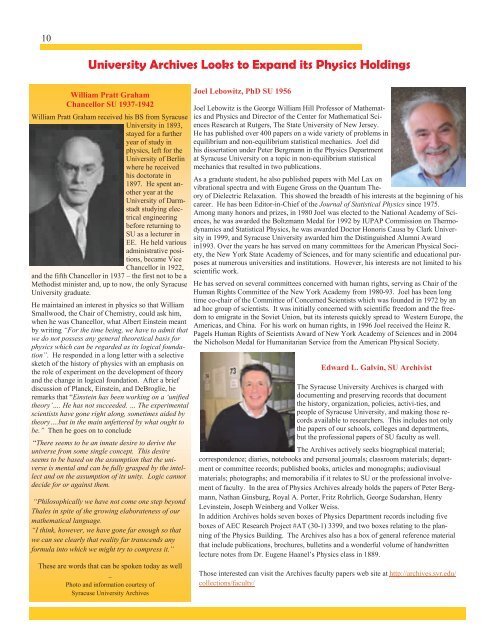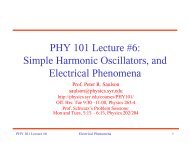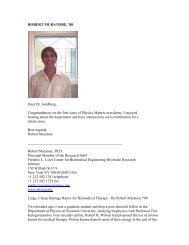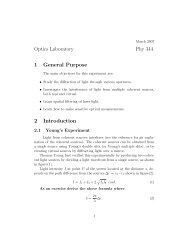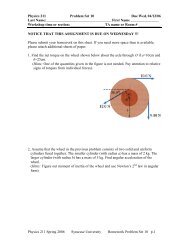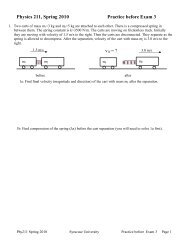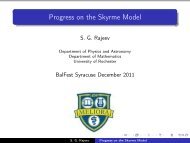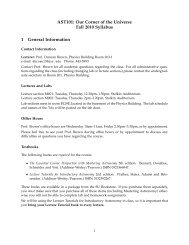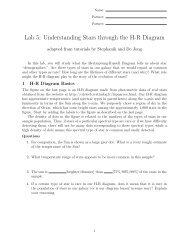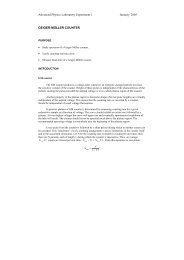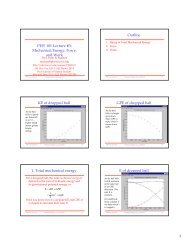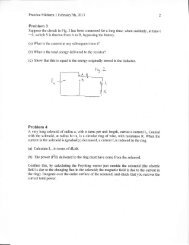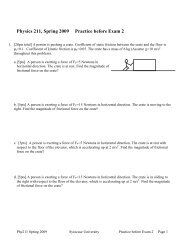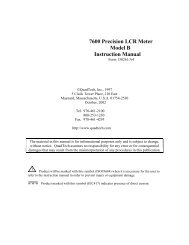Volume 5 - Physics - Syracuse University
Volume 5 - Physics - Syracuse University
Volume 5 - Physics - Syracuse University
You also want an ePaper? Increase the reach of your titles
YUMPU automatically turns print PDFs into web optimized ePapers that Google loves.
10<br />
<strong>University</strong> Archives Looks to Expand its <strong>Physics</strong> Holdings<br />
William Pratt Graham<br />
Chancellor SU 1937-1942<br />
William Pratt Graham received his BS from <strong>Syracuse</strong><br />
<strong>University</strong> in 1893,<br />
stayed for a further<br />
year of study in<br />
physics, left for the<br />
<strong>University</strong> of Berlin<br />
where he received<br />
his doctorate in<br />
1897. He spent another<br />
year at the<br />
<strong>University</strong> of Darmstadt<br />
studying electrical<br />
engineering<br />
before returning to<br />
SU as a lecturer in<br />
EE. He held various<br />
administrative positions,<br />
became Vice<br />
Chancellor in 1922,<br />
and the fifth Chancellor in 1937 – the first not to be a<br />
Methodist minister and, up to now, the only <strong>Syracuse</strong><br />
<strong>University</strong> graduate.<br />
He maintained an interest in physics so that William<br />
Smallwood, the Chair of Chemistry, could ask him,<br />
when he was Chancellor, what Albert Einstein meant<br />
by writing “For the time being, we have to admit that<br />
we do not possess any general theoretical basis for<br />
physics which can be regarded as its logical foundation”.<br />
He responded in a long letter with a selective<br />
sketch of the history of physics with an emphasis on<br />
the role of experiment on the development of theory<br />
and the change in logical foundation. After a brief<br />
discussion of Planck, Einstein, and DeBroglie, he<br />
remarks that “Einstein has been working on a ‘unified<br />
theory’…. He has not succeeded. … The experimental<br />
scientists have gone right along, sometimes aided by<br />
theory….but in the main unfettered by what ought to<br />
be.” Then he goes on to conclude<br />
“There seems to be an innate desire to derive the<br />
universe from some single concept. This desire<br />
seems to be based on the assumption that the universe<br />
is mental and can be fully grasped by the intellect<br />
and on the assumption of its unity. Logic cannot<br />
decide for or against them.<br />
“Philosophically we have not come one step beyond<br />
Thales in spite of the growing elaborateness of our<br />
mathematical language.<br />
“I think, however, we have gone far enough so that<br />
we can see clearly that reality far transcends any<br />
formula into which we might try to compress it.”<br />
These are words that can be spoken today as well<br />
..<br />
Photo and information courtesy of<br />
<strong>Syracuse</strong> <strong>University</strong> Archives<br />
Joel Lebowitz, PhD SU 1956<br />
Joel Lebowitz is the George William Hill Professor of Mathematics<br />
and <strong>Physics</strong> and Director of the Center for Mathematical Sciences<br />
Research at Rutgers, The State <strong>University</strong> of New Jersey.<br />
He has published over 400 papers on a wide variety of problems in<br />
equilibrium and non-equilibrium statistical mechanics. Joel did<br />
his dissertation under Peter Bergmann in the <strong>Physics</strong> Department<br />
at <strong>Syracuse</strong> <strong>University</strong> on a topic in non-equilibrium statistical<br />
mechanics that resulted in two publications.<br />
As a graduate student, he also published papers with Mel Lax on<br />
vibrational spectra and with Eugene Gross on the Quantum Theory<br />
of Dielectric Relaxation. This showed the breadth of his interests at the beginning of his<br />
career. He has been Editor-in-Chief of the Journal of Statistical <strong>Physics</strong> since 1975.<br />
Among many honors and prizes, in 1980 Joel was elected to the National Academy of Sciences,<br />
he was awarded the Boltzmann Medal for 1992 by IUPAP Commission on Thermodynamics<br />
and Statistical <strong>Physics</strong>, he was awarded Doctor Honoris Causa by Clark <strong>University</strong><br />
in 1999, and <strong>Syracuse</strong> <strong>University</strong> awarded him the Distinguished Alumni Award<br />
in1993. Over the years he has served on many committees for the American Physical Society,<br />
the New York State Academy of Sciences, and for many scientific and educational purposes<br />
at numerous universities and institutions. However, his interests are not limited to his<br />
scientific work.<br />
He has served on several committees concerned with human rights, serving as Chair of the<br />
Human Rights Committee of the New York Academy from 1980-93. Joel has been long<br />
time co-chair of the Committee of Concerned Scientists which was founded in 1972 by an<br />
ad hoc group of scientists. It was initially concerned with scientific freedom and the freedom<br />
to emigrate in the Soviet Union, but its interests quickly spread to Western Europe, the<br />
Americas, and China. For his work on human rights, in 1996 Joel received the Heinz R.<br />
Pagels Human Rights of Scientists Award of New York Academy of Sciences and in 2004<br />
the Nicholson Medal for Humanitarian Service from the American Physical Society.<br />
Edward L. Galvin, SU Archivist<br />
The <strong>Syracuse</strong> <strong>University</strong> Archives is charged with<br />
documenting and preserving records that document<br />
the history, organization, policies, activi-ties, and<br />
people of <strong>Syracuse</strong> <strong>University</strong>, and making those records<br />
available to researchers. This includes not only<br />
the papers of our schools, colleges and departments,<br />
but the professional papers of SU faculty as well.<br />
The Archives actively seeks biographical material;<br />
correspondence; diaries, notebooks and personal journals; classroom materials; department<br />
or committee records; published books, articles and monographs; audiovisual<br />
materials; photographs; and memorabilia if it relates to SU or the professional involvement<br />
of faculty. In the area of <strong>Physics</strong> Archives already holds the papers of Peter Bergmann,<br />
Nathan Ginsburg, Royal A. Porter, Fritz Rohrlich, George Sudarshan, Henry<br />
Levinstein, Joseph Weinberg and Volker Weiss.<br />
In addition Archives holds seven boxes of <strong>Physics</strong> Department records including five<br />
boxes of AEC Research Project #AT (30-1) 3399, and two boxes relating to the planning<br />
of the <strong>Physics</strong> Building. The Archives also has a box of general reference material<br />
that include publications, brochures, bulletins and a wonderful volume of handwritten<br />
lecture notes from Dr. Eugene Haanel’s <strong>Physics</strong> class in 1889.<br />
Those interested can visit the Archives faculty papers web site at http://archives.syr.edu/<br />
collections/faculty/


